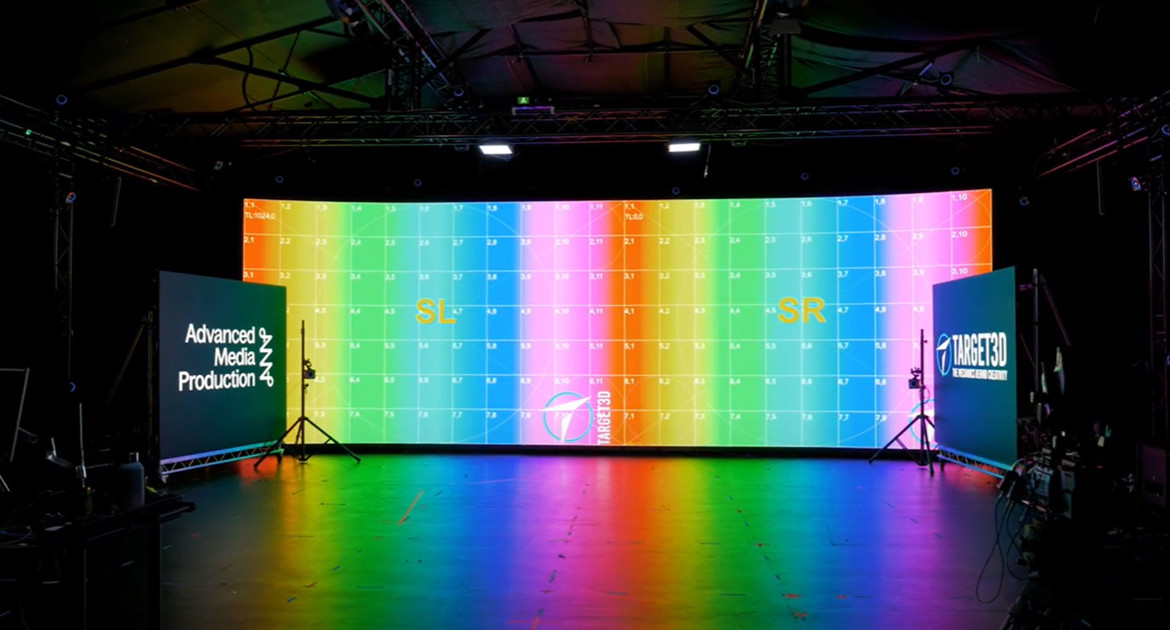Building a state-of-the-art virtual production studio
One of the most groundbreaking advancements in recent years is virtual production.
This innovative approach seamlessly blends the physical and digital worlds, allowing filmmakers to create stunning visuals with unprecedented flexibility and efficiency. A compelling example of this technology in action is highlighted in a recent case study with Target3D, PSCo, Absen and Brompton Technology.

What is virtual production?
Virtual production is an umbrella term for digital filmmaking techniques integrating live-action footage and computer-generated imagery (CGI) in real time. Unlike traditional production, where CGI is often added in post-production, virtual production blends digital and physical elements during the actual filming process. This integration provides creatives with a dynamic and interactive environment, enabling them to visualise and manipulate scenes as they are captured.
The challenge – creating Target3D’s vision
Target3D – 3D technology consultancy – is a hardware company specialising in motion capture, 3D technologies and virtual production. They define themselves as “the mechanics behind creativity”. Joining a venture partnership with Digital Catapult, they embarked on an ambitious mission to create a virtual production test stage.
What was to become an 18-month project began with the goal of creating a studio that went beyond the typical virtual production setup. It needed to be as flexible and modular as possible. The requirement was an LED wall to fit a wide range of purposes and different camera setups. High dynamic range and the greatest visual fidelity were key necessities.
The solution – finding the right LED
Target3D turned to PSCo, experts in LED technology, to find the right LED for their requirements. The journey began at Innovation House, PSCo’s dedicated LED experience centre. They were able to demonstrate a variety of LED products and camera testing to find the perfect product.
PSCo’s hands-on support and expertise were invaluable in navigating the complexities of LED technology and ensuring the chosen setup met all requirements. During the deployment phase, Target3D were able to lean on PSCo’s manufactured accredited services to support the installation and commissioning of the LED.
PSCo were really helpful in our configuration of the LED. We initially requested a setup and configuration which didn’t quite work – there were acoustic challenges which we didn’t quite appreciate when we first set up
– Allan Rankin, Founder/Managing Director at Target3D.
Ultimately, Absen supplied a 10.5 x 3.5mm LED backdrop to create realistic backgrounds and environments. The 1.9mm PL1.9 Pro V10 Brompton fine-pitch LED display is perfect for shooting short distances while being flexible enough for different configurations, ensuring it can adapt to various production needs.
The Absen panels used are driven by Brompton SX40s, and each has a Brompton R2+ receiver card built in. The Brompton processor and Absen LED panel essentially use a unique language to ensure everything works together perfectly. And because Brompton technology controls the setup, everything can be fine-tuned for the best performance.
Additionally, Brompton has its own proprietary calibration system called Hydra, producing the highest level of colour accuracy possible on LED. Its unique feature – Shutter Sync – also matches the PWM timing of the LED to exactly what the camera is doing, reducing errors or artefacts.
PSCo, Absen and Brompton are experts in their field – they have been able to offer us a lot of value and help us shortcut some of the questions that we would otherwise have been wrestling with a lot longer
– Ashley Keeler, Founder/Head of Studio at Target3D.
The result
The result of this collaboration is a state-of-the-art virtual production studio that stands out for its modularity and adaptability. Housing over 2,000 pieces of equipment, the studio supports a wide array of production activities, including performance capture, plate shoots, green screen shoots and virtual production training.
The studio’s flexibility and hardware-agnostic design set Target3D apart from the competition, allowing it to showcase the incredible capabilities of virtual production. Whether it’s jumping to different virtual locations or using one performer to embody many different characters, it shows the transformative impact virtual production has on storytelling.

